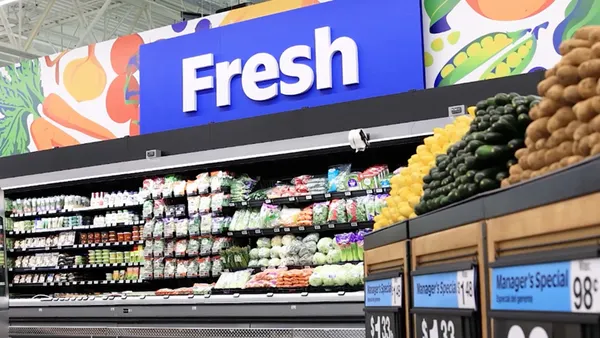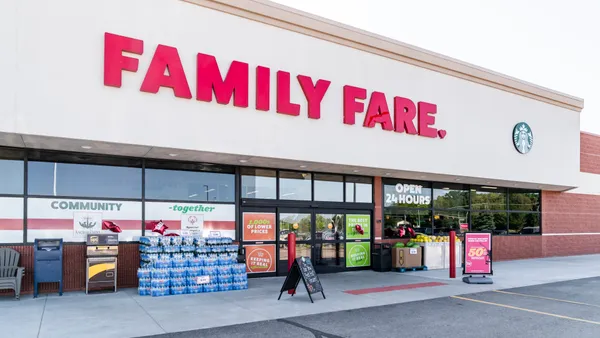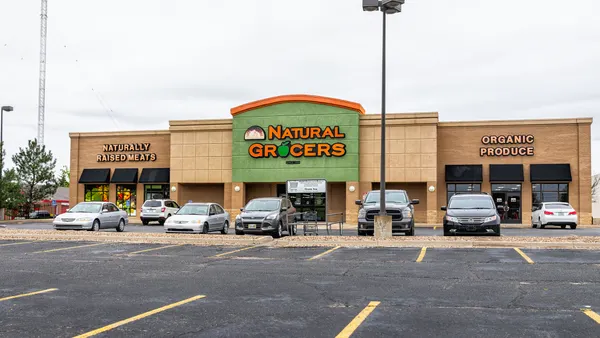Dive Brief:
- Stop & Shop announced plans to acquire Bethpage, New York-based King Kullen Grocery Co. The agreement includes 32 King Kullen brand stores, five Wild by Nature locations and use of the regional grocer’s corporate office. Officials expect the deal to close in this year’s first quarter, subject to customary closing conditions.
- Executives with Ahold Delhaize, which operates Stop & Shop, said in a presentation late last year the company is open to acquisitions to strengthen its positioning along the East Coast. They said the company favors regional grocers that are No. 1 or No. 2 in their markets.
- “King Kullen is a well-respected grocery chain in the Long Island market that has an 88-year tradition of excellent customer service,” Stop & Shop President Mark McGowan said in a statement. “We look forward to bringing our quality, selection and value to more communities in Nassau and Suffolk Counties.”
Dive Insight:
Stop & Shop’s parent company, Ahold Delhaize, sees itself in an advantageous position to acquire small, promising chains along the East Coast. Competition has heated up in key regions stretching from New York to Florida, and the market dynamics favor well-capitalized competitors like the Dutch grocery titan.
The company's acquisition adds fuel to an increasingly heated Long Island grocery battle, and sets up a showdown between Stop & Shop and Lidl, which recently acquired the Best Market chain that is also headquartered in Bethpage, New York.
Even if Stop & Shop's pickup was not influenced by the Lidl deal, the acquisitions will expedite the battle between the discounter and the legacy Northeast grocer. Lidl’s U.S. expansion got off to a poor start, but the chain is steadily opening stores and adjusting its approach, and its small-box, low-price approach targets traditional grocers like Stop & Shop.
As the clash develops, Stop & Shop’s deep roots in the Northeast and leading position on Long Island are in its favor. The banner also just kicked off a refresh that could eventually make its way into the region — though it’s unclear if Stop & Shop will keep the King Kullen brand or turn the stores into Stop & Shop locations. (Grocery Dive has reached out to Stop & Shop but has not yet received a response.) The store updates, which have rolled out to 21 stores around Hartford, Connecticut, include digital kiosks, food bars, wood smokers and other experience-focused touches aimed at meeting evolving shopper demands for fresh, adventurous meal options.
The updates aim to turn fortunes around for Stop & Shop, which has seen sales volumes decline in recent quarters and has underperformed compared to other Ahold Delhaize chains such as Food Lion and Hannaford. Analysts say the chain and its parent company have been slow to respond to shifting consumer demands and increasing competition.
“Stop & Shop especially is caught in this undifferentiated zone," Elley Symmes, senior analyst with Kantar Consulting, told Grocery Dive in a recent interview. "The brand story behind the business, the offering, there’s no real unique reason why anybody is going into those stores besides they have really great real estate.”
With King Kullen, Stop & Shop gains a historic chain that also has deep roots with shoppers. The company’s first location, which opened in 1930 in Jamaica, Queens, has been dubbed the world’s first supermarket. It offered self-service shopping and several departments under one roof — something unique in that age of specialty vendors.
King Kullen hasn’t been as innovative in the decades that followed, though it is still operated by the family of founder Michael Cullen. Last year, it expanded its online shopping footprint and in August named new executives in several departments — including perishables, human resources, marketing and operations.
This acquisition marks the third pickup of a regional grocer by a larger company in as many months. In addition to Lidl’s Best Market pickup, SpartanNash acquired Martin’s Super Market and its 21 stores. As the race for low prices, store investments and digital innovation continues to pressure grocers to scale up or exit the business, look for more regional acquisitions in 2019 and beyond.













